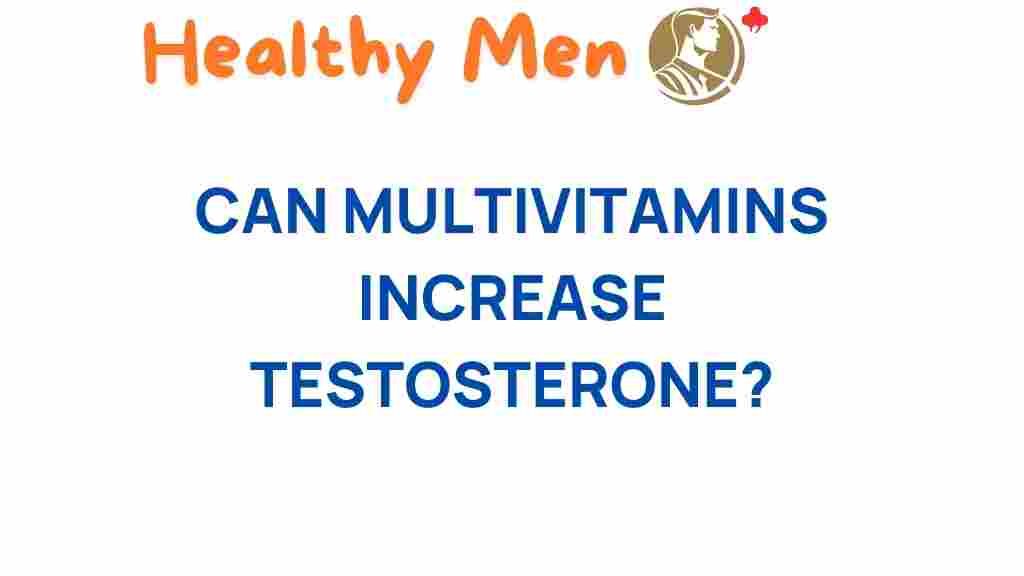Unveiling the Truth: Can Multivitamins Boost Testosterone Levels?
In the ever-evolving world of health and wellness, the quest for optimal male health often leads to discussions about testosterone levels and the potential role of multivitamins in enhancing these hormone levels. Testosterone, a vital hormone for men, influences everything from muscle mass to mood. As more individuals turn to health supplements to improve their well-being, the question arises: can multivitamins genuinely boost testosterone levels?
Understanding Testosterone and Its Importance
Testosterone is crucial for various aspects of male health, including:
- Muscle Growth: It plays a significant role in muscle development and strength.
- Bone Density: Supports bone health and reduces the risk of osteoporosis.
- Libido: Affects sexual drive and performance.
- Mood Regulation: Influences mental health, energy levels, and motivation.
As men age, testosterone levels naturally decline, leading many to seek ways to maintain their hormone levels through nutrition and supplementation.
Can Multivitamins Affect Testosterone Levels?
The relationship between multivitamins and testosterone is complex. While there is no definitive evidence that multivitamins directly boost testosterone levels, certain vitamins and minerals found in these supplements can support overall hormonal balance and health. Here’s how specific nutrients play a role:
- Vitamin D: Some studies suggest a correlation between vitamin D levels and testosterone. Supplementing with vitamin D may help those with deficiencies improve their testosterone levels.
- Zinc: Zinc is essential for testosterone production. A deficiency in zinc can lead to lower testosterone levels, and supplementation may help restore them.
- Magnesium: This mineral has been shown to support testosterone levels, especially in physically active individuals.
The Role of Nutrition in Testosterone Production
Optimal testosterone production relies heavily on nutrition. A balanced diet rich in essential nutrients can significantly impact hormone levels. Consider incorporating the following into your diet:
- Healthy Fats: Sources like avocados, nuts, and olive oil support hormone production.
- Protein: Adequate protein intake is crucial for muscle mass and overall health, which can indirectly influence testosterone.
- Fruits and Vegetables: These provide antioxidants and essential vitamins that support overall wellness.
Choosing the Right Multivitamin for Male Health
When selecting a multivitamin, consider the following tips to ensure you’re making a choice that supports your testosterone and overall health:
- Look for Key Nutrients: Ensure the multivitamin contains essential vitamins and minerals like vitamin D, zinc, and magnesium.
- Check Dosages: Pay attention to the dosages of each nutrient; they should align with recommended daily allowances.
- Opt for Quality Brands: Choose reputable brands that have third-party testing for quality assurance.
Supplementing Alongside Multivitamins
While multivitamins can be beneficial, they may not provide all the necessary nutrients required for optimal testosterone levels. Consider these additional health supplements:
- Omega-3 Fatty Acids: Support heart health and may help in reducing inflammation.
- Creatine: Known for its benefits in muscle mass and strength, creatine may indirectly support testosterone levels through increased physical activity.
- Herbal Supplements: Some herbs, such as fenugreek and ashwagandha, have shown promise in supporting testosterone levels.
Step-by-Step Process to Optimize Testosterone Levels
To effectively maintain or boost testosterone levels, follow these steps:
- Assess Your Diet: Evaluate your current eating habits and identify areas for improvement.
- Incorporate Multivitamins: Choose a high-quality multivitamin that contains essential nutrients.
- Consider Additional Supplements: If necessary, add specific supplements like omega-3s or herbals that may benefit testosterone levels.
- Maintain an Active Lifestyle: Regular exercise, particularly strength training, can help boost testosterone levels.
- Manage Stress: High stress can negatively impact hormone levels; consider mindfulness practices.
- Get Adequate Sleep: Quality sleep is essential for hormonal balance.
Troubleshooting Tips for Low Testosterone Levels
If you suspect low testosterone levels despite taking multivitamins and maintaining a healthy lifestyle, consider these troubleshooting tips:
- Consult a Healthcare Professional: Discuss your symptoms and consider testing your hormone levels.
- Review Your Medications: Certain medications can affect testosterone levels; consult your doctor for alternatives.
- Limit Alcohol Consumption: Excessive drinking can negatively impact testosterone production.
- Stay Hydrated: Dehydration can affect overall health, including hormone levels.
Conclusion: The Path to Wellness
While multivitamins alone may not directly boost testosterone levels, their role in supporting overall health and nutrition cannot be overlooked. A combination of a balanced diet, quality supplements, and a healthy lifestyle can significantly impact male health and hormone levels. As you embark on this journey towards enhanced wellness, remember that every individual’s body is different, and what works for one may not work for another. Always consider discussing with a healthcare professional before making significant changes to your supplement routine.
For more information on supplements and nutrition, check out this resource.
Invest in your health today for a better tomorrow, and embrace the journey to optimal fitness and wellness!
This article is in the category Nutrition and created by healthymen Team
